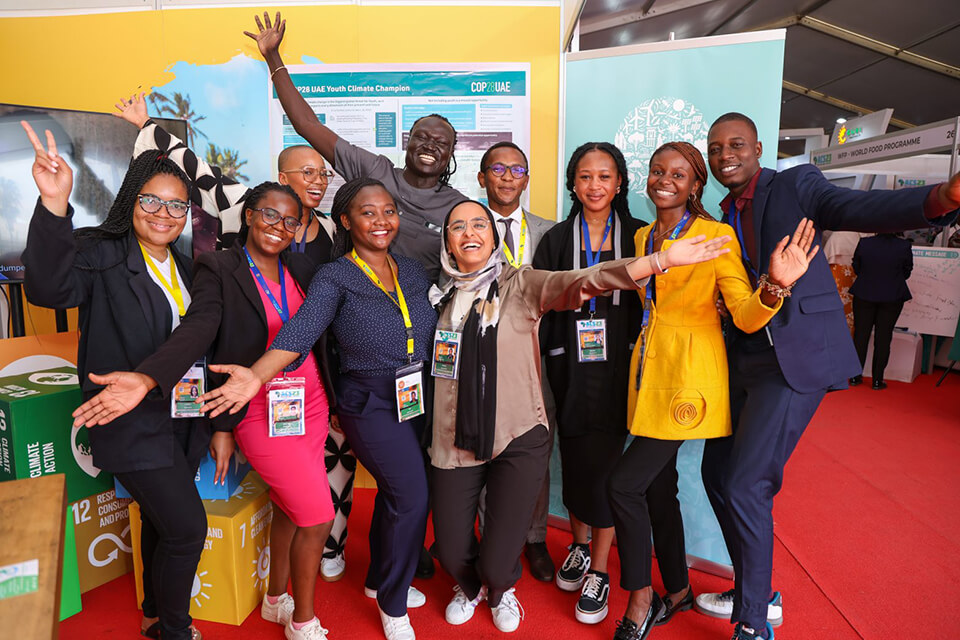- Introduction
- Government Policies and Programs Targeting Youth Empowerment
- Collaboration Between Governments and Youth Organizations
- Case Studies of Government-Led Youth Empowerment Initiatives
- Challenges and Opportunities in Government Support for Youth Empowerment
- Frequently Asked Questions (FAQs)
- Conclusion
Introduction
African government support for youth empowerment is crucial. With the way the world is evolving, a parent’s role in nurturing and supporting their child to chase their dreams is how governments have a significant role in helping young people reach their full potential. They can help provide the skills and opportunities they need to succeed. Governments can support youths through education, job training, and funding for new businesses.
When governments invest in young people, they help individuals and build a better future for everyone. Many African countries are working hard to create programs that support young people in areas like technology, agriculture, and entrepreneurship. But what exactly are African governments doing to help youths succeed? Let’s explore their different steps to ensure young people can thrive and achieve their dreams!
Definition of Youth Empowerment.
Youth empowerment means providing tools that enable them to make decisions about their lives. This includes education, skills training, and access to resources. It also involves urging them to participate in their communities and have a say in what happens within them.
Empowerment helps youths understand their rights and responsibilities and creates opportunities to develop leadership skills. Through different programs, young people learn problem-solving and working with others toward one objective. Generally speaking, empowerment is about building a generation for positive change in society.
Importance of Youth Empowerment for National Development in Africa.
Youth empowerment contributes a great deal to national development in Africa, for numerous reasons.
- Reduces Unemployment: Many youths in Africa are jobless. Through youth empowerment, they acquire education and training that would enable them to seek employment or create their own businesses. This fosters economic growth and minimizes poverty.
- Engages Social Change: Empowered youth speak up on relevant issues affecting their lives, especially those related to community development and policies.
- Drives Innovation: The youth have new ideas and innovative problem-solving methods. Their potential is enhanced, bringing about innovation in many sectors, such as technology, agriculture, and health.
- Grooms Future Leaders: Empowering the youth means acquiring relevant leadership skills. This makes it easy to have better leaders facing future challenges.
In essence, investing in the young people will ensure a secure and prosperous future for all. The role of youth empowerment in Africa’s future can not be overemphasized.
Overview of Government Roles in Youth Empowerment.
African governments have continued to support youth empowerment by formulating and implementing policies that enhance education, skill acquisition, and entrepreneurship.
- Education and Training: Most governments provide free or affordable (or discounted) education to young people to help them acquire knowledge and skills. They also have vocational training programs that equip the youth with practical skills like carpentry, coding, and fashion.
- Job Creation Activities include initiatives like the Nigeria Jubilee Fellows Programme and N-Power, which connect graduates to job opportunities and skills training to make them employable and give them work experience.
- Financial Support to Businesses: Governments also provide funding and loans to young entrepreneurs. This aids them in setting up and expanding their businesses, thus creating more jobs within the economy.
- Collaboration with NGOs and Private Sectors: Collaboration between/among governments, NGOs, and private sectors helps to facilitate youth empowerment programs. By collaborating, they share their resources and ideas to develop better opportunities for the youth.
African government support for youth empowerment goes a long way in ensuring a secure future for the continent. Given the proper education, skills, and opportunities, the youth will contribute to improving their communities, economy, and society, and build a future filled with growth, innovation, and success.

Government Policies and Programs Targeting Youth Empowerment
- Analysis of Existing Youth-Focused Policies in Africa.
Most African countries have developed policies that specifically target the growth and development of youths. An example is the African Youth Charter, which protects the rights of the youths and addresses youth-related issues like education, jobs, gender equality, and health. This charter, adopted by the African Union (AU), has challenged each country to develop a National Youth Policy with an aim to address the specific issues faced by young people.
For example, Nigeria and Ghana have created their own National Youth Policies to improve education and employment opportunities for youth. These policies pave the way for youth inclusion in government decision-making processes. With such policies in place, the important thing is implementing them to ensure they reach the youth as intended.
- Highlighting Flagship Programs
Some African governments have enacted special programs to help youth secure jobs and learn new skills. These programs are essential as they create jobs, develop business skills, and help youth become self-employed.
For instance, the Nigeria Jubilee Fellows Programme connects graduates with job opportunities while providing essential skills training. Another important initiative is N-Power, which offers paid volunteer opportunities and skills training in various sectors like education and health. Additionally, many governments provide education subsidies to make schooling more accessible for young people. These programs not only help reduce unemployment but also encourage entrepreneurship among youths.
These programs are clear evidence that African governments are committed to empowering youth. Equipping the youth with the necessary skills in these programs prepares them for life.
- Role of Legislation in Creating Enabling Environments for Youth.
Laws play a vital role in providing an enabling environment for youths to thrive. Governments that guarantee the protection of young people’s rights help them acquire equal opportunities in education and employment.
For example, the African Union calls for all countries on the continent to make laws favorable to young people. These laws ensure that youths are not discriminated against and that their voices are represented in government decisions. When given a chance to participate in leadership and decision-making, young people may play an essential role in solving big problems affecting their communities.
Strong laws and policies create the most conducive environment for youth development. They offer young people the possibilities of learning, working, and innovating—all for the betterment of Africa’s future. Focusing on government support for youth empowerment reveals that these policies, programs, and laws hold much weight in steering the youth down the path of success.
Collaboration Between Governments and Youth Organizations
- Importance of Partnerships Between Governments and Grassroots Youth Organizations.
Collaboration between governments and youth organizations would help advance youth empowerment. The partnership ensures that the voices of young people can be heard in the event of a big decision. For example, when governments collaborate with localized organizations, they will better understand the challenges young people face. It, therefore, allows them to formulate policies and programs that will genuinely assist youths.
They know how to mobilize youth because they are closer to the community and solve their problems. When they work together, it is also easier to share resources to provide training, education, and awareness campaigns. When African governments support youth empowerment, the results positively change society.
- Examples of Successful Collaborations.
These are many great examples of how African governments and youth organizations have been in a position to work together exceptionally well.
One good example is the Africa Youth Partnership for an Equitable Recovery, which helps young people recover from the effects of COVID-19. YOTA (Youth Opportunity and Transformation in Africa) implemented the first phase of the Africa Youth Partnership, funded by the Ford Foundation, to empower young people in Africa for an equitable COVID-19 response. It is one project that brings together governments, NGOs, and youth groups to resolve the social and economic problems caused by the pandemic.
Another example is the Youth for Peace Africa Programme. The African Union collaborates with youth groups in this program to advance peace and security. These partnerships are examples of how governments and young people can collaborate to think creatively and create opportunities that can benefit both youth and their communities.
- Role of International Organizations in Fostering Government-Youth Partnerships.
International organizations also play a crucial role in bringing together governments and youth organizations. They provide funding, training, and technical support for implementing youth programs. For example, the Mastercard Foundation works with various African governments to upgrade education and vocational training. This helps young people acquire the skills they need to access better jobs.
The United Nations is another organization that supports projects that encourage youth participation in governance. By bringing different groups together, international organizations create opportunities for youth empowerment on a larger scale. Their work ensures that the needs of young people are not ignored. The more governments, youth organizations, and international groups work together, the more powerful and reaching youth empowerment gets. It means that young people can contribute to decision-making and receive resources. Teamwork is the key to a better future for African youths!

Case Studies of Government-Led Youth Empowerment Initiatives
Country-Level Analysis of Successful Youth Empowerment Programs
Many governments across Africa have formed initiatives to empower youth. Such initiatives equip the youth with skills, training, and job opportunities. An example of this is Nigeria’s N-Power scheme. This reduces unemployment among youths by providing them with paid volunteering and skill acquisition in sectors such as education and healthcare. Thousands of Nigerians have been equipped with on-field experience coupled with earning a monthly stipend from this scheme.
Another example is the Kenyan Ajira Digital program. It assists the youth in finding online employment by training them in digital skills. Having acquired these skills, many youths can work remotely and earn an income that helps them improve their economic situation. All these programs have demonstrated how African government support for youth empowerment helps the youth secure jobs for a better future.
Metrics for Assessing the Impact of These Initiatives.
Knowing whether a youth empowerment program is working requires understanding its impact. Governments and organizations use a host of metrics to assess these impacts.
- Employment Rate: The rate at which youths get employed after the program is completed will be a way to measure its success. For example, the number of N-Power graduates who find permanent jobs would indicate whether the program was effective.
- Skill Improvement: Another measure of impact could be how much participants learn. This can be measured by comparing their skills before and after training.
- Participant Feedback: The program participant feedback can help gauge satisfaction and areas for improvement
- Economic Impact: An extremely successful youth empowerment program eventually contributes to the empowerment of communities. For example, more young people in jobs would mean more family providers and contributors to the local economy.
These metrics are helpful in enabling governments to tailor youth empowerment initiatives to reach the intended effectiveness.
Lessons Learned From Case Studies and Their Scalability Across The Continent.
Important lessons can be learned that may lead to the success of other youth empowerment programs.
- Programs need to address the needs in their immediate environment. Problems differ from one country to another. Similarly, Youth Empowerment Programs are to be planned in accordance with particular requirements.
- Youth Involvement: When youth are involved in the design and implementation process, they will feel a certain commitment to it. This will also assist them with a sense of ownership.
- Collaboration is Key. Governments, NGOs, and private companies must collaborate to share resources and expertise, which makes the programs more effective.
- Scalability is Possible: Successful programs like N-Power and Ajira Digital can be expanded into other African countries. Each country can adapt these programs according to their needs based on economic or social conditions.
These case studies would, therefore, realize that African government support for youth empowerment makes a difference. More countries can learn from these examples to develop programs offering pathways for youth to build their futures.

Challenges and Opportunities in Government Support for Youth Empowerment
Challenges
Despite the challenges, African governments’ efforts to support Youth Empowerment are commendable. The potential of these programs to make a significant impact is immense. However, the biggest hurdle they face is the funding gap. Many programs are not sufficiently funded, making their operation or expansion difficult. Due to the lack of appropriate funding, such programs cannot cover all the young people who require help.
Another big issue is corruption. Sometimes, money that was supposed to go for youth projects is taken for personal use, which reduces the effectiveness of the government and makes life harder for young people who need help.
Another challenge is political instability. Sometimes, because of the political changes in different countries, new governments stop all those previously running youth programs and make a whole change. Lack of continuity has also been another critical element that has further reduced the effectiveness of youth empowerment for sustainable development.
The last is the untapped potential of youth involvement in policymaking. Many young people are excluded from essential discussions of laws and programs affecting their lives. However, their voices hold the key to policies that can truly meet their real needs. If these challenges are not met, African government support for the empowerment of the youth will not be as effective as it should be.
Opportunities
There are, however, a few opportunities that the African continent has for youth empowerment.
First, there is using technology. With digital platforms, youths can access education, training, and jobs anywhere. For example, online courses teach valuable skills without the requirement of a physical classroom. Another major step would be increasing private-sector partnerships. When businesses and governments work together, they can create more jobs and finance youth programs. Firms can share their knowledge and experience with young people.
Expanding education access is vital. Governments must ensure that all youths receive quality education, even vocational training for practical skills. Education enables youths to get employment and contribute to national development. Through these opportunities, African governments can work on youth empowerment and build the next generation of leaders.
Recommendations for Overcoming Challenges and Maximizing Opportunities
To overcome challenges and maximize opportunities in youth empowerment, several recommendations can be made:
- More Financial Transparency: Governments should increase transparency in funding processes to combat corruption. This includes regular audits and public reporting on how funds are used for youth programs.
- Establish mentorship programs: Mentorship is where the youths learn a lot from experienced professionals. Mentorship programs will help them get guidance and support as they grow in their careers.
- Engage the youth in policy-making: Governments should create platforms where the youth can give their views concerning the policies that affect them. This will ensure that programs meet their needs.
- Closer collaboration with private sectors and international organisations: If governments collaborate with businesses and international groups, more funds and resources would be available. Hence, youth empowerment programs can be expanded.
If these steps are followed, then the African governments would be able to provide better support to youth empowerment. This would help develop the fullest potential of the youths.
Frequently Asked Questions (FAQs)
1. What is youth empowerment?
Youth empowerment refers to developing their skills, confidence, and opportunities in life to enable them to participate and contribute in their communities and societies
2. Why is youth empowerment important in Africa?
Africa needs youth empowerment to reduce unemployment, create social change, and grow its economy. The continent’s youth constitute a large majority, so empowering them would mean a great future.
3. What are the challenges facing the youth empowerment programs?
These include funding gaps, corruption, political instability, and limited participation of youths in policy formulation processes; hence, this restricts the full operation of the programs for empowerment.
4. How can private-sector partnerships benefit youth empowerment?
Private sector partnerships can offer additional resources, job opportunities, and training for young people. By working together, governments and businesses can create more effective programs that address the needs of youths
5. What role do international organisations play in youth empowerment?
International organizations provide funding, resources, and expertise to support youth empowerment initiatives. They can create partnerships with governments and local organizations to enhance the impact of programs.

Conclusion
In conclusion, the African government’s support of youth empowerment has been pivotal for the continent’s development. By investing in the youth, governments are helping to build a qualified labour force, which brings new ideas and positive changes to society. Importantly, empowered youths are not just leaders of the future but are actively shaping the present.
All this will require improving policies, bringing together NGOs and private companies, and greater investment in education and vocational skills training, equipping youth with appropriate tools to tackle life.
The aim is to have government-supported and empowered youth. A continent where young men and women are actively contributing to the development of their communities and economies. If provided with the right support, they would become the driving force for sustainable development and help Africa grow stronger and better.
Now is the time for governments, businesses, and societies to come together to create a world where all young people can flourish. Empowering youth secures a brighter and more prosperous future for Africa.



